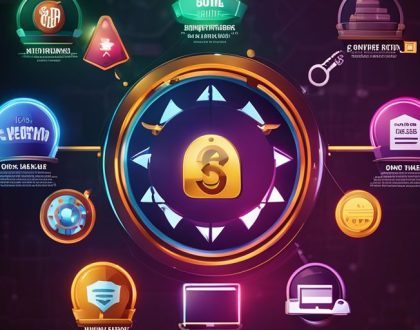The Checklist for iGaming License Application Success

Most prospective iGaming operators understand that obtaining a license is a critical step in launching a successful online gambling business. However, the application process can be complex and challenging, with stringent requirements that must be met to ensure approval. To help streamline this process and increase the chances of success, we have compiled a comprehensive checklist of key steps and critical factors that should be considered when applying for an iGaming license.
From conducting thorough market research and creating a robust business plan to establishing effective responsible gambling measures and ensuring compliance with all regulatory requirements, this checklist covers the necessary elements that can make or break an iGaming license application. By following these guidelines and meticulously preparing your application, you can position your iGaming business for success in the competitive online gambling industry.
Understanding iGaming Licenses
For any business looking to operate in the iGaming industry, obtaining the right iGaming license is crucial. These licenses are issued by regulatory bodies and authorize companies to offer online gambling services legally. There are various types of iGaming licenses that you can apply for, depending on the type of services you intend to provide.
Types of iGaming Licenses
- Casino License: This license is specifically for online casinos offering games such as slots, table games, and live dealer games.
- Sports Betting License: Required for operators offering sports betting services, including both pre-match and in-play betting.
- Poker License: For platforms that offer online poker rooms and tournaments.
- Lottery License: Issued for operators running online lottery games and promotions.
- Combined License: Some jurisdictions offer a comprehensive license covering multiple iGaming verticals.
Though the requirements for each type of license may vary, the application process generally involves submitting detailed business plans, undergoing background checks, and demonstrating compliance with regulations.
Jurisdictions Offering iGaming Licenses
Any company seeking to obtain an iGaming license can choose from a variety of jurisdictions around the world. Some of the most popular jurisdictions offering iGaming licenses include Malta, Curacao, the United Kingdom, Gibraltar, and the Isle of Man. Each jurisdiction has its own set of regulations and requirements for obtaining an iGaming license, so it is important to thoroughly research and understand the specifics of each before applying.
Another crucial factor to consider when selecting a jurisdiction for your iGaming license is the reputation and credibility of the regulatory body overseeing the industry. It is important to choose a jurisdiction with a strong track record of enforcing regulations and protecting players’ interests. Ensure that the jurisdiction you choose offers a stable legal environment, clear guidelines on compliance, and efficient licensing processes.
Preparing for the Application
There’s a lot to consider when preparing for an iGaming license application. Proper planning and organization are crucial to ensure a smooth application process and increase the chances of success. It is necessary to gather all the necessary documentation, such as financial statements, business plans, and background checks, well in advance to avoid any delays in the application process.
Building a Business Plan
With the fierce competition in the iGaming industry, having a well-thought-out business plan is necessary for standing out from the crowd. A comprehensive business plan should outline your company’s goals, target market, marketing strategies, and financial projections. Highlighting your unique selling points and showcasing how your business will be a valuable addition to the iGaming market can significantly improve your chances of securing a license.
Ensuring Compliance and Fairness of Games
Application of regulatory requirements and ensuring the fairness of games are paramount in the iGaming industry. Compliance with licensing regulations, such as anti-money laundering measures, responsible gaming practices, and data protection standards, is non-negotiable. Additionally, using certified Random Number Generators (RNGs) and regularly auditing games for fairness by independent testing agencies are crucial steps to instill trust and credibility among players and regulators.
The success of your iGaming license application largely depends on how well you demonstrate your commitment to compliance and fairness in your operations. Emphasizing these aspects in your application will not only expedite the licensing process but also build a reputation as a trustworthy and reputable iGaming operator in the industry.
The Application Process Step-by-Step
Registering the Company
To start off the iGaming license application process, you need to register your company in the jurisdiction where you intend to operate. This typically involves choosing a business structure, registering the company name, and providing details about the ownership and management of the company.
| An important | to-do in this step is to ensure that your company meets all the legal requirements set forth by the licensing jurisdiction. Failing to comply with these requirements can result in delays or even rejection of your application. |
Documentation and Paperwork Requirements
Any iGaming license application will require a wide range of documentation and paperwork to be submitted. This can include but is not limited to financial statements, background checks on key personnel, a business plan, a technical plan, and compliance documentation.
The key to success in this step is to be thorough and accurate in preparing and submitting all required documentation. Missing or incomplete paperwork can lead to delays in the application process or even outright rejection of your application.
The documentation and paperwork requirements are in place to ensure that only legitimate and compliant operators are granted iGaming licenses. Failure to provide the necessary documentation can signal to the authorities that your operation may not meet the required standards.
Technical Requirements and Software
Software Quality Standards
Keep in mind that iGaming license applications require adherence to strict software quality standards. It is crucial to ensure that your software meets industry best practices, such as reliable functionality, scalability, and compatibility across various devices and platforms. Failure to meet these standards can result in your application being rejected or future penalties if your software is found to be lacking.
Security and Data Protection Protocols
To safeguard sensitive player information and maintain a secure gaming environment, iGaming license applicants must demonstrate robust security and data protection protocols. Encryption, authentication measures, and secure payment processing are vital components that regulators look for in assessing the security of your platform.
Quality: Applicants should invest in thorough testing and audits to identify and address any vulnerabilities in their security protocols. Any weaknesses in security can significantly impact the success of the license application.
Financial Prerequisites and Projections
Demonstrating Financial Stability
Many iGaming license applications require applicants to demonstrate financial stability to ensure they can operate a sustainable business. This includes providing detailed financial projections, balance sheets, and cash flow statements to prove the ability to cover operational costs and payouts to players. Transparency and accuracy in financial information are crucial for a successful license application.
To strengthen your application, it is vital to show a healthy financial standing with realistic and achievable financial projections. This will provide regulators with confidence in your ability to meet ongoing financial obligations and maintain a solvent operation in the long term.
Anti-Money Laundering (AML) and Financial Regulations
Regulations governing anti-money laundering (AML) and financial practices are paramount in the iGaming industry. Applicants must demonstrate a comprehensive understanding of AML laws and how they plan to comply with them. This includes implementing robust AML policies, conducting due diligence on customers, and reporting suspicious transactions to relevant authorities.
It is crucial to abide by strict AML and financial regulations to prevent illicit activities such as money laundering or terrorist financing within the iGaming sector. Failure to comply with these regulations can result in severe consequences, including hefty fines and license revocation.
After Submission: The Waiting and Evaluation Process
What Happens After Submission
Your iGaming license application has been submitted, and now the waiting game begins. This is a critical phase where the regulatory body will carefully review your application to ensure compliance with all regulations and requirements. Any missing or incomplete information can result in delays or even a rejection of your application. It is important to be patient during this time and be ready to provide any additional documents or information that the regulatory body may request.
How to Handle Queries from the Regulatory Body
Evaluation of your iGaming license application may prompt queries or requests for clarification from the regulatory body. Handling these queries promptly and professionally is crucial to demonstrate your commitment to compliance and transparency. Any delays or inadequate responses can raise red flags and may jeopardize the approval of your application. Be prepared to provide detailed explanations or additional documentation to address any concerns raised by the regulatory body.
Evaluation: It is important to respond to queries from the regulatory body in a thorough and timely manner to facilitate the review process and increase the chances of a successful application.
Maintaining the License and Regulatory Compliance
Regular Auditing and Reporting
One of the critical aspects of maintaining an iGaming license is to ensure regular auditing and reporting. This involves conducting internal audits to assess compliance with regulations and industry standards. Additionally, it is crucial to submit timely reports to the regulatory authorities to demonstrate transparency and adherence to the set guidelines.
Operating Within Legal and Regulatory Frameworks
The key to successfully maintaining an iGaming license is to operate within legal and regulatory frameworks at all times. Adhering to these frameworks not only ensures compliance but also builds trust with regulators and customers. It is vital to stay informed about any changes in regulations and update operational practices accordingly to avoid any potential breaches that could result in penalties or even the revocation of the license.
Auditing plays a crucial role in ensuring that the operations of an iGaming business are in line with legal and regulatory requirements. Regular audits help identify any areas of non-compliance and provide an opportunity to rectify issues before they escalate. Compliance with regulations is not optional; it is a necessity for the sustainability and success of an iGaming business.
Final Words
As a reminder, the Checklist for iGaming License Application Success is a comprehensive guide that covers all the crucial requirements and considerations for a successful license application. By following each item on the checklist diligently, operators can increase their chances of obtaining a license and launching their iGaming operations smoothly. It is crucial to pay attention to details, comply with regulations, and provide all necessary documentation to present a strong application to the regulatory authorities.
Successfully navigating the iGaming licensing process can be complex and challenging, but with the right preparation and adherence to the checklist, operators can streamline the application process and position themselves for success in the competitive iGaming industry. By ensuring that each item on the checklist is addressed thoroughly, operators can demonstrate their commitment to compliance and responsible gaming practices, ultimately leading to a positive outcome in their license application.
Recommended Posts

Why iGaming Licenses Matter
April 30, 2024

Playtech and Fortuna Elevate Online Poker
April 30, 2024

Short Guide to iGaming Affiliates
April 30, 2024
